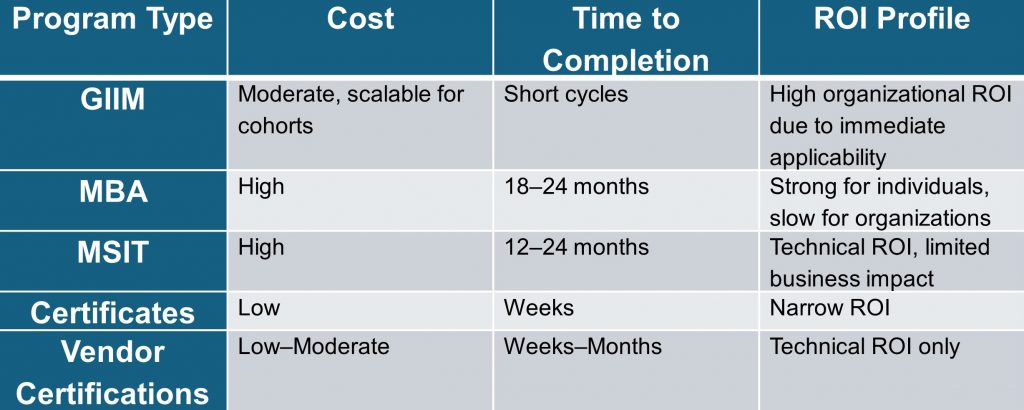Flexible Competitive Pricing

Tuition/pricing considerations include:
- delivery approach/model (e.g., face-to-face, web, asynchronous/blended, schedule, venue)
- number of candidates
- competitiveness of fees/tuition in the geography (e.g., affordability, culture, audience, objectives)
- availability and location of the required/requested faculty number of expected attendees
- university programs usually apply the respective university tuition
Five (5) Flexible Delivery Models:
- Face-to-Face, live, in person
- Distance Learning (web online) – Synchronously/live
- Distance Learning (web online) – Asynchronously/online
Blended/Hybrid:
- Synchronous/live
- Asynchronous/online
Baseline tuition ($US) that GIIM receives for the different delivery models:
Live Synchronous
Live Synchronous Face-to-Face (F2F)
- Same time, same place.
- Affiliate/Group rates are at least $40,000 per 40-hour course for up to 30 candidates / students.
- Price may vary based on venue.
- For executive seminars that do not follow the 4-course certificate model, GIIM receives $10,000 per day, depending on the venue and number of candidates.
- All live schedules are flexible and would be derived together with GIIM.
Live Synchronous Online Courses
- Same time, different place
- Affiliate/group rates are at least $30,000 per 40-hour course for up to 30 candidates / students.
- For executive seminars that do not follow the 4-course certificate model, GIIM receives $10,000 per day,
- All live schedules are flexible and would be derived together with GIIM.
Asynchronous & Blended/Hybrid
Asynchronous Online
- Any time, any place, self-paced
- North America, Australia, and parts of Western Europe, Middle East, Asia, & SE Asia: 30-hour asynchronous delivery via the GIIM Cloud (Learning Management System [LMS] using SAP Litmos) $750 per student; $3,000 for the 4-course certificate.
- Other than North America, Australia, and parts of Western Europe, Middle East, Asia, & SE Asia: GIIM will work with affiliates based on the considerations above, using geo-pricing (geographical pricing) and partial scholarships, usually grounded on the tuition fee charged by a good local university 30 – 40 hour advanced Master’s Degree course.
Blended/Hybrid
- We strongly encourage supplementing the 30+ hours of asynchronous online lectures (left column) presented by GIIM subject matter experts/faculty with one of GIIMs two blended/hybrid models facilitated by GIIM or local faculty:
- 10-hour synchronous blended/hybrid supplemental synchronous (live face-to-face or online) class discussions and projects facilitated by local/GIIM faculty, an additional $750 per student, minimum; hence, the 4-course certificate would cost $6,000 per candidate/student. The minimum number of student requirement varies based on venue
- Self-paced asynchronous online blended/hybrid supplemental Q&A and projects facilitated by local/GIIM faculty, an additional $500 per student, minimum; hence, the 4-course certificate would cost $5,000 per candidate/student. The minimum number of students required is 15.
- Other than North America, Australia, and parts of Western Europe, Middle East, Asia, & SE Asia: To keep the tuition affordable, GIIM will work with affiliates to prepare their local faculty to serve as facilitators / mentors for the supplemental live sessions.
Master's Degrees (MBA, MS)
- GIIM works with its affiliates to derive the most viable delivery, financial, scheduling, and co-branding models.
- Affiliates are compensated based on considerations including revenue generated, delivery model(s), faculty, pricing, frequency/number of students, venue, & role in the process.
GIIM vs. Other IT Management Education Programs











